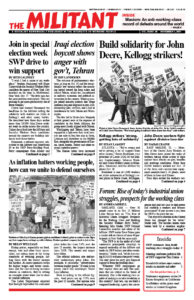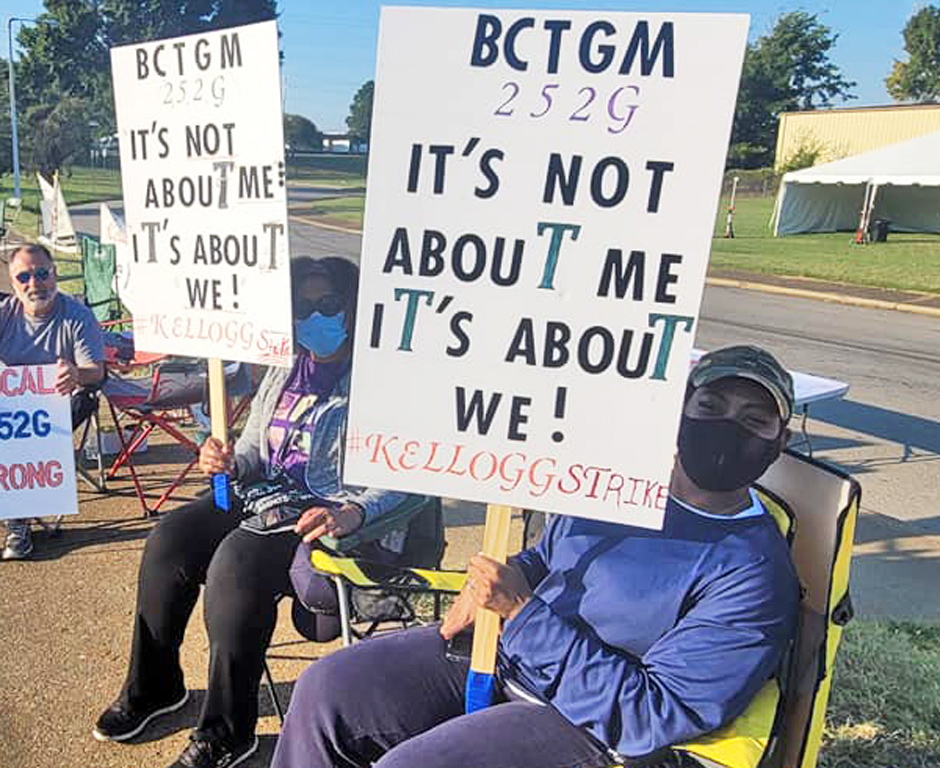ATLANTA — “We’re strong and we’re getting a lot of support from other unions,” Kevin Bradshaw, vice president of Local 252G of the Bakery, Confectionery, Tobacco Workers and Grain Millers union in Memphis, Tennessee, told the Militant by phone Oct. 18.
Bradshaw is one of 1,400 workers on strike nationwide at Kellogg’s cereal plants in Battle Creek, Michigan; Omaha, Nebraska; Lancaster, Pennsylvania; and Memphis.
They are standing up to the bosses’ push to build on past concessions forced on the union and to deepen divisions among workers. The company is demanding a two-tier contract, with new hires stuck at $13 an hour less than veteran workers and no way for them to ever reach the highest pay rate. The contract saddles these workers with worse benefits and pensions. It would eliminate cost-of-living adjustments, and end the 30% limit on the number of workers bosses can hire on inferior wages, conditions and benefits. To add insult to injury, the company is demanding the cereal boxes no longer carry the union label.
Growing support on picket line
“Autoworkers, steelworkers, Teamsters, CWA, IBEW, UFCW, IATSE and others have all stopped by, brought donations and helped walk our picket line,” Bradshaw said. Support has also been received from community and Black rights groups, as well as churches, including the Baptist Ministerial Association.
This is the third strike in the past few months fought by members of the Bakery Workers union. Workers at Frito-Lay in Topeka, Kansas, struck in July and successfully pushed back “suicide shifts,” with only eight-hour breaks between day after day of 12-hour shifts. BCTGM members at Nabisco made gains in their strike over work schedules, seniority, mandatory overtime, cuts to pensions and rising health insurance costs. In both fights the unionists won solidarity from working people and their unions, They held off boss attacks and returned to work stronger and more united, having used union power to defend workers’ interests.
“We have 274 union members on strike here in Memphis,” Bradshaw said. “About 70% of us were here when the nine-month-long company lockout began in October 2013. They’re veterans of that fight, so that’s a big help to us now.”
At that time Kellogg’s bosses locked the Memphis workers out when the union refused to accept different pay and conditions for temporary, part-time workers. The unionists won reinstatement after a hard-fought struggle.
They carried banners harking back to the fight against Jim Crow segregation, saying, “Kellogg’s this is not the 1960s — We’ve already won our rights!” with a picture of Martin Luther King Jr. Memphis is 64% Black and BCTGM Local 252G in its majority is African American. Bradshaw also serves as president of the Coalition of Black Trade Unionists there.
“The company tries to give the impression that they’re talking to the union, but that’s not true,” Bradshaw said. “They’ve started to bus in scabs to the Memphis plant. We’re seeing four or five buses drive in, but only about 30-40 workers get off. From information we’re getting, they are only doing cleanup as of now, no production.”
“It was great to hear about the strike at John Deere,” Bradshaw said. Over 10,000 workers there, members of the United Auto Workers, went on strike Oct. 14. The BCTGM in Memphis is organizing a solidarity rally with the UAW and Central Labor Council on Sat., Oct. 23, at noon on the picket line on Airways Boulevard, near the Kellogg’s plant.
The BCTGM website lists the locations of the strike picket lines at all four cereal plants where you can join in and drop off food, drinks and other needed supplies. It also lists the mail and email addresses where you can send messages of support and contributions at https://bctgm.org/2021/10/08/5-ways-to-support-the-kelloggstrike.


